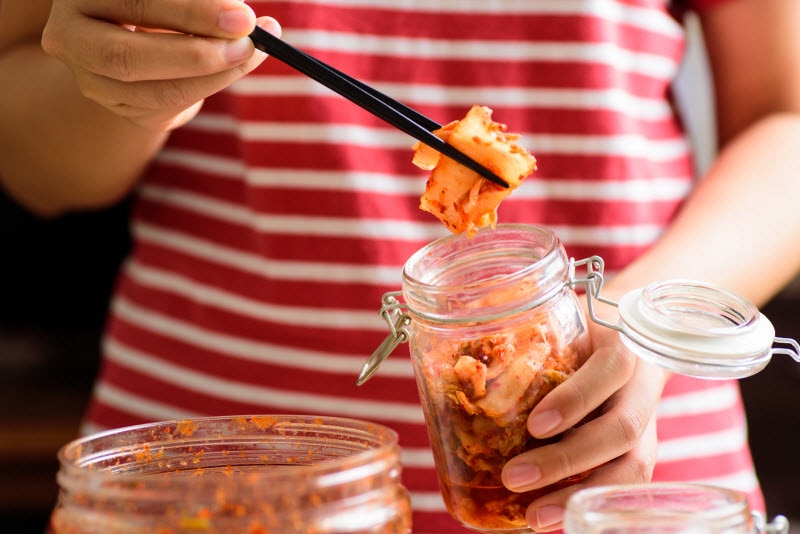In recent years, you may have picked up on all the talk regarding your microbiome, from the insistence that it operates as your second brain to the sudden appearance of kefir on your grocery store shelf. And if you haven’t? Then now is the time to listen.
Why? Because your microbiome is one of the most crucial systems in your body. Comprised of trillions of microorganisms, and primarily housed in a pocket of your large intestine, it impacts nearly every major function in your body: your mood, your weight, your cardiovascular health, your cognitive function and your immune system.
Indeed, 70% of your immune system is contained in your microbiome, with your gut and immune system in a constant dialogue to help detect invaders, tolerate non-damaging microbes, and signal a sound and healthy immune response.
Supporting a healthy microbiome
As hard as it works for you, when your gut microbiome is out of balance (in what’s known as dysbosis), you may experience a host of health problems, from leaky gut syndrome to brain fog. Alas, the Standard American Diet, which is typically filled with sugar, empty carbohydrates, and processed foods, impairs gut health by fostering the growth of “bad” bacteria rather than “friendly” flora. Chronic stress, the overuse of antibiotics—even negative self-talk—can further harm gut health and may lead to autoimmune diseases, anxiety, depression and more.
As daunting as this may sound, healing your gut is completely within your power—and it can start working right away. (As Dr. Christiane Northrup says, “the average lifespan of bacterium in your microbiome is 20 minutes…so you have the opportunity every time you eat to begin to change the population of your gut microbiome.”) Yes, eat, for as much of a role that stress, inadequate sleep and medications play a role in your gut health, your diet is the single most important factor for altering it.
With this in mind, we’ve pulled together six fresh ways to start changing your microbiome for the better:
1. Don’t get stuck in a rut
Eating the same thing day after day may seem smart: It requires little thought, after all, to continually turn to what you find appetizing and nourishing. Your gut, however, needs a variety of foods in order for its “good” bacteria to flourish. Aim to eat dynamically, with a close eye on the organic fruits and vegetables presently in season.
2. Turn meals into a luxurious event
If you’re in the habit of eating a hard-boiled egg over the sink and downing lunch in a rush to get back to your desk, stop, as it’s akin to trying to write a report while the TV is blaring in the background while a family member is demanding your attention. (Read: brain overload.) Eating in a calm, meditative state allows you to focus not only on the amount and quality of food before you, but it also aids in digestion.
3. Fill up on probiotic foods
Probiotic foods, such as yogurt, sauerkraut, pickles and kimchee, contain healthful bacteria (like Bifidobacteria and Lactobacilli) that help strengthen your intestinal barrier and prevent leaky gut syndrome, a condition in which bacteria and other toxins seep out of your gut and enter your bloodstream, potentially putting you at risk for irritable bowel syndrome and celiac disease, among other complications.†
4. Spice it up
Spices don’t just transform a mediocre dish into something marvelous—they can also do wonders for your microbiome. Turmeric, for example, contains a compound called curcumin that has been found to not only help with dysbiosis but may also offer cognitive support. Other spices to start shaking on your culinary creations: Garlic, which promotes the growth of good bacteria; cayenne, which can increase fluid production and aid in digestion; cinnamon, which may help ward off bad bacteria, and ginger, which the National Institutes of Health says possesses “prebiotic-like effects of promoting the growth of beneficial bacteria on one hand and suppressing pathogenic bacteria on the other, suggesting [its] potential role in the regulation of intestinal microbiota and the enhancement of gastrointestinal health.”†
5. Baby your liver
Your liver is the largest organ in your body, and it has an even larger role in keeping you (and your microbiome) healthy: It processes nutrients, helps clean out toxins—including “bad” gut bugs—and influences the gut-microbiome composition and your gut barrier integrity. Refined sugar, high-fructose corn syrup (which hides out in food we typically think of as benign, such as ketchup, multi-grain crackers, applesauce and protein bars), alcohol, and even acetaminophen can all harm this ever-important organ.
Eating liver-supportive foods, however, can “help reduce die-off reactions and kill bad gut bugs with more ease,” says Tchiki Davis, PhD. Add bitter greens (such as dandelion leaves) to your salad, snack on raw radishes, and eat cruciferous vegetables: Arugula, kale, broccoli and the like contain DIM, a substance that “helps the liver detox effectively,” Davis says.†
6. Head to the countryside
Happen to live in an urban area? Make a concerted to get out of the city more often: Research shows that city dwellers have less diverse microbiota than their country-living counterparts, in part due to “reduced exposure to the microbes in rural environments,” Science Daily reports.
Others, such as Northrup, even suggest getting dirty. “While being clean is fine, overly sterile environments don’t promote biodiversity of your gut bacteria,” she says, adding, “Go ahead and get dirty.” Whether that’s through gardening, hitting up a rustic trail, or hopping on your mountain bike is, of course, completely up to you.
†These statements have not been approved by the Food and Drug Administration. These products are not intended to diagnose, treat, cure or prevent disease.




